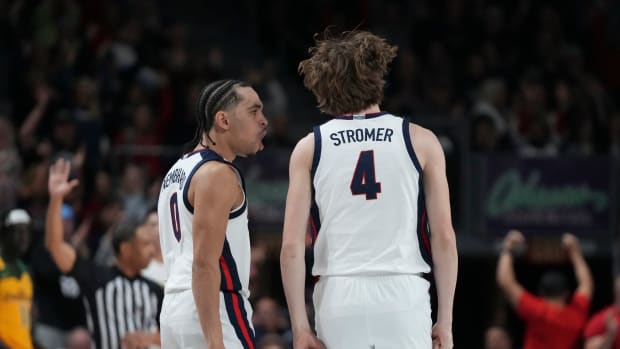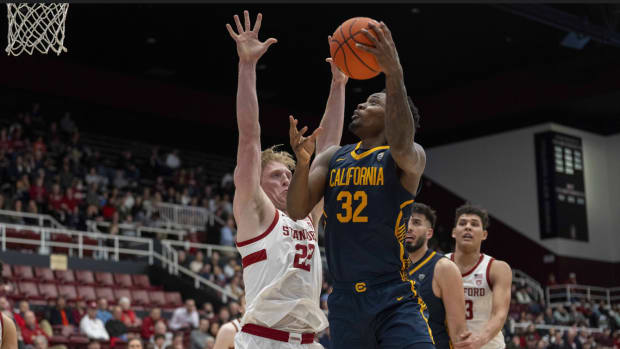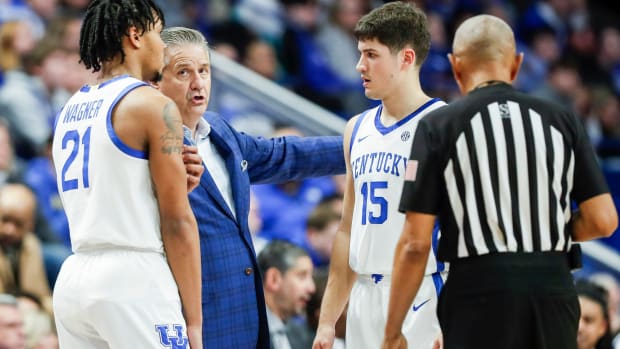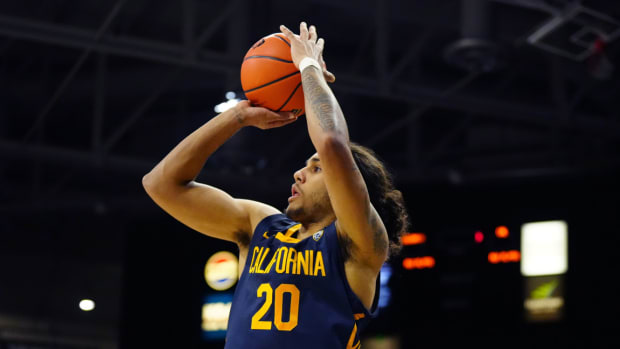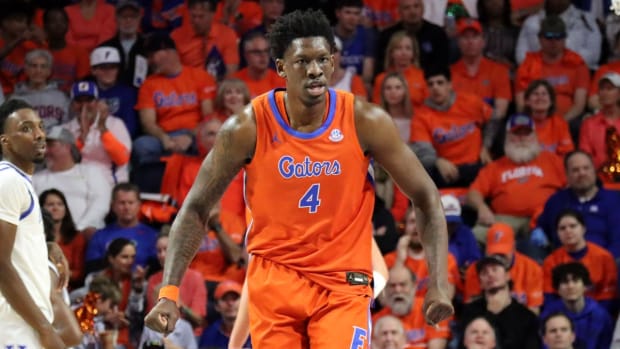East region preview: Why each team will and won't make the Final Four
You may not have watched every game of the NCAA tournament, but don’t worry: We did. We’ll tell you how each team got to the Sweet 16 and why they will or won’t make the Final Four. You can also read about the Midwest, South and West regions.
Louisville vs. N.C. State
Friday, 7:37 p.m. on CBS
Louisville Cardinals
How they got here: Beat No. 13 UC-Irvine, 57-55, and No. 5 Northern Iowa, 66-53
Despite trying season, Louisville still standing after beating Northern Iowa
Why they'll make the Final Four: Entering the tournament, Louisville seemed to be a longshot even to make the second weekend, much less Indianapolis. The Cardinals are down to three playmakers—sophomore guard Tery Rozier, junior forward Montrezl Harrell and senior wing Wayne Blackshear—but they are bringing their best game to the Big Dance. Rozier scored 25 points on 7-of-10 shooting against UNI, and Montrezl Harrell added 14, making 5-for-11. Blackshear has 29 points in two games, well above his season average of 11.2 points per game.
The emergence of freshman guard Quentin Snider has also been a boon. Coach Rick Pitino prefers to have a rotation of three guards, primarily to run his complicated matchup zone defense. Snider has filled in admirably, and the team is playing some of its best defense of the season. Snider has also alleviated some of the offensive pressure on the big three; his season-long offensive rating is 91.9, but he's averaging 119.5 in two tournament games so far.
Why they won't make the Final Four: Louisville still has a pancake-thin margin for error. An off night from Rozier, in particular, could be fatal. This team is also Rick Pitino's worst group of three-point shooters ever at Louisville—they make just 30.8% from beyond the arc, 308th in the country. As Villanova showed, an over-reliance on the three-ball can be a team's undoing. If an opponent gets a big lead on Louisville, this group of Cardinals cannot shoot themselves back into the game.
In fact, this isn't a strong shooting team in any category. They make just 48.7% of their two-pointers (126th in the country) and 66.7% of their free throws (259th). Making the Final Four requires playing four games of your best basketball. Louisville has already played two as well as it possibly can. Can the Cardinals keep up the pace to make a most unexpected Final Four?
— David Gardner
N.C. State Wolfpack
How they got here: Beat No. 9 LSU, 66-65, and No. 1 Villanova, 71-68
N.C. State players used rollercoaster year as motivation to upset Villanova
Why they'll make the Final Four: The Wolfpack will have no shortage of confidence heading into the Sweet 16. They are the only team in the tournament to have taken down a No. 1 seed, and they also have proven to themselves that they can fight their way out of a bad situation, as they did in overcoming a 16-point deficit against LSU in the Round of 64. And, of course, they've already beaten their Sweet 16 opponent. Conference opponents typically do not face each other in the Sweet 16, but it is allowed if they only played once during the regular season. N.C. State beat the Cardinals in Louisville on Feb. 14, which kickstarted its strong finishing kick that has seen the Wolfpack win eight of its last 10 games.
And N.C. State is playing much better now than it was even a month ago. It has a rotation of six players who each use between 18.5% and 24.5% of available possessions. Guards Trevor Lacey and Anthony "Cat" Barber lead the way with impressive offensive ratings of 113.6 and 108.7, respectively, and made a series of clutch plays to put away Villanova. The emergence of freshman big man Abdul-Malik Abu, who had a double-double against the Wildcats, gives the Wolfpack an inside presence it sorely needed.
Why they won't make the Final Four: Wofford. Clemson. Wake Forest. Boston College. They're all sub-85 teams on kenpom.com, and they've all beaten N.C. State this season. The Wolfpack were inconsistent in the regular season, and although they seem to be peaking right now, they're definitely beatable. They struggle on defense, particularly in creating turnovers—where they are 345th in the country—and don't do a great job on the glass on either end.
Although Abu is a nice addition, the Wolfpack still don't have a dominant frontcourt. The rotation doesn't feature any player taller than 6'9", and they're offensive block percentage (how often they're rejected) of 10.1% is 221st in the country. They don't excel at two-point (47.7%) or three-point shooting (35.4%), and a cold night against a good defense in Louisville could send them home as early as Friday.
— D.G.
Michigan State vs. Oklahoma
Friday, 10:07 p.m., CBS
Michigan State Spartans
How they got here: Beat No. 10 Georgia, 70-63, and No. 2 Virginia, 60-54
Michigan State marching to Sweet 16, but magic isn't the reason why
Why they’ll make the Final Four: The Spartans go to Syracuse for the East Regional as the third-highest seed in that bracket, yet it’s hard not to think of them as the favorite. That’s not just because Tom Izzo has been to six Final Fours since 1999, making him one of the best tournament coaches in the country. It’s also because Michigan State is playing its best ball of the season. The Spartans have won six of their past seven, with the only loss coming against Wisconsin in overtime in the Big Ten final. The first four of those wins came against NCAA-tournament-bound teams in Purdue, Indiana, Ohio State and Maryland, and the last two have come in the tourney itself, against Georgia and, most notably, No. 2 seed Virginia.
Seniors Travis Trice and Branden Dawson have led the way for Michigan State. Trice, a guard, has averaged 19 points over the past month and the same amount in the tournament, more than four points above his season average, and shot 7-of-13 from three-point range in the NCAAs. Dawson, an undersized power forward, has averaged 15.2 points per game since the start of the Big Ten tournament compared to 11.6 before that, and had 15 points, nine rebounds and four blocks in the upset of the Cavaliers.
Why they won’t make the Final Four: The Spartans have long enjoyed a reputation as a rugged club that feasts on the glass, but they’ve been outrebounded in the tournament so far by both Georgia and Virginia. They rank 14th in the country in adjusted offensive efficiency and 29th in the country in effective field goal percentage but are shooting just 44% in the NCAA tournament so far. How long can they survive with poor shooting and poor rebounding?
While Trice and Dawson have performed well so far, Michigan State got past the Cavaliers despite getting only four points from Denzel Valentine. It was the 10th single-figure scoring game of the year for the 6’5” junior, but the last three times it happened he came back with at least 20 in his very next outing. The Spartans can only hope that happens again this time because it needs as much offense as it can muster against Oklahoma.
— Ted Keith
Oklahoma Sooners
How they got here: Beat No. 14 Albany, 69-60, and No. 11 Dayton, 72-66
Sunday's games set up a second weekend 'chalk-full' of storylines
in effective field goal percentage defense, so they should be able to withstand any offensive droughts.
They are also active on the boards, ranking 22nd in the country—and third among remaining tournament teams—with 38.1 rebounds per game. And should a game come down to free throws, the Sooners will be comfortable at the line, where they shoot almost 74%, ranking in the top 40, and have three guards—Frank Booker, Buddy Hield and Jordan Woodard—who are each well north of 80%.
Lastly, there is Hield, who was the Big 12 Player of the Year and might be the best player in Syracuse this weekend.
Why they won’t make the Final Four:The Sooners are one of just two teams to have not had to beat a top-10 seeded team so far in the tournament and they haven’t been overly impressive in their victories either, winning their two games against non-Power Five schools by an average of 7.5 points. With the increased level of competition, they can no longer get by on talent alone.
Speaking of talent, Hield will need to play better this weekend than he did last weekend if Oklahoma is to reach its first Final Four since 2002. He shot just 10-for-29 from the floor, including 4-for-17 from outside, and grabbed only seven rebounds in the wins over Albany and Dayton.
— T.K.


